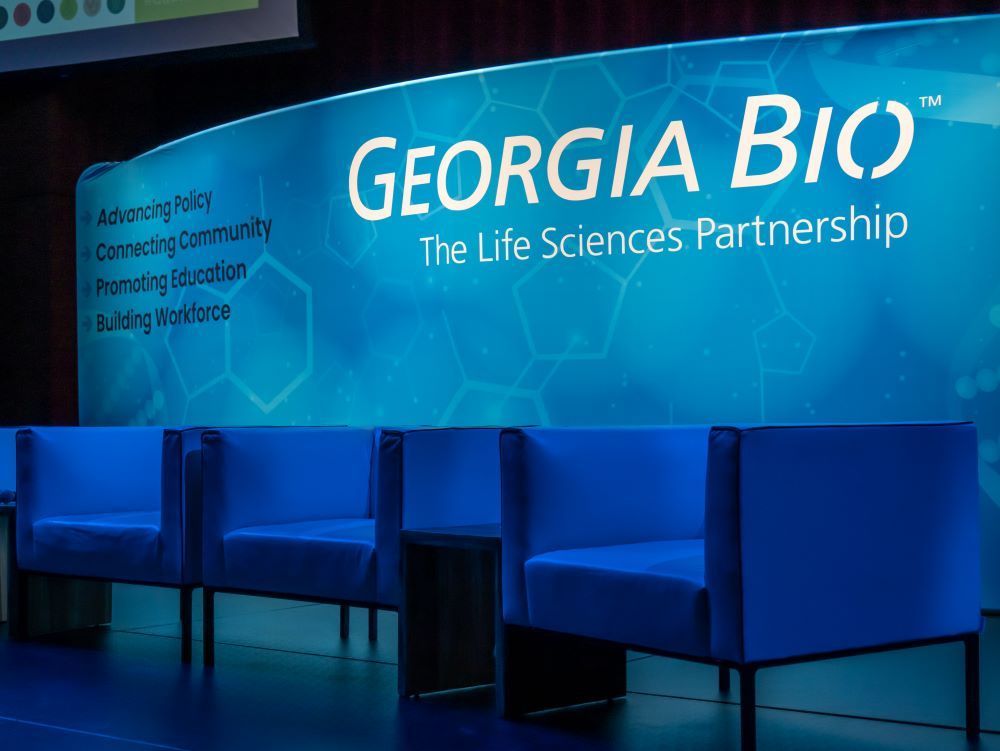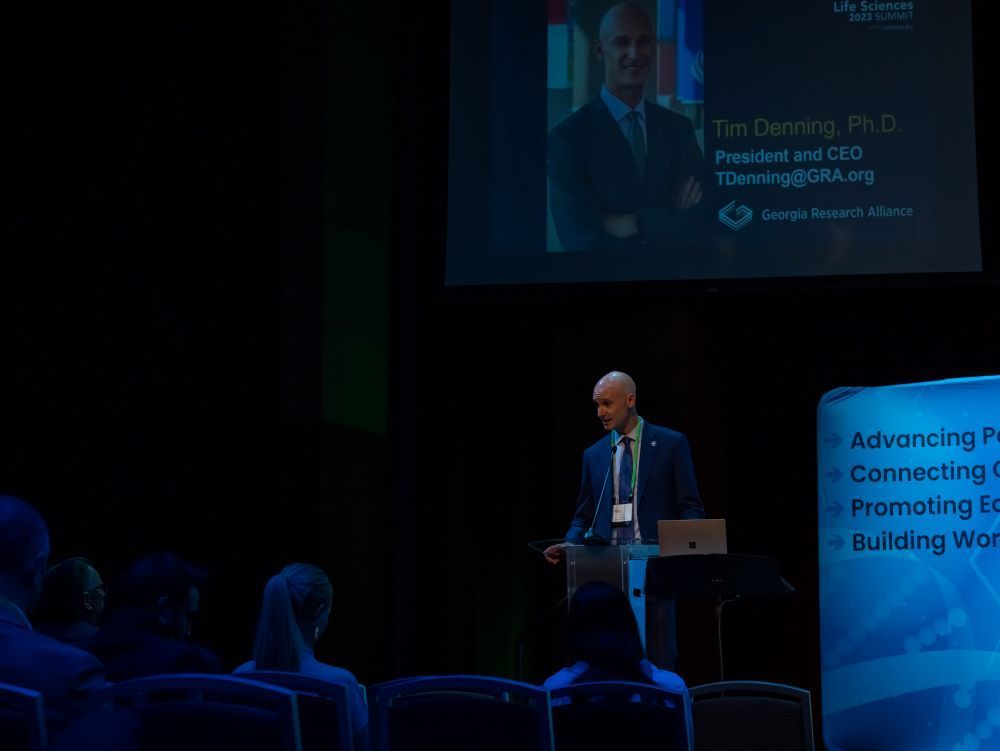Access and Innovation: Georgia Bio Recommits to Industry as a new c6 & New GRA CEO Opens the 2023 Georgia Life Sciences Summit

Having recently renewed our commitment to advocating for, educating and connecting our member enterprises and stakeholders, the 2023 Georgia Life Sciences Summit by Georgia Bio brought more than 300 members of the ecosystem together in Sandy Springs on November 1st.
We reconnected with friends and colleagues, made new connections, learned from academic, industry and elected leaders, shared news and awarded both the [early stage] Company Showcase Winners and the Anthony Shucker Scientific Poster Winners.
Our CEO Maria Thacker Goethe reinforced a statement made during the October virtual town hall , as a 501c6, Georgia Bio can be more politically active and allows for future creation of a political action committee. The organization is the sole Georgia representative to the life science sector and an official partner to the national Bioscience Industry Organization and AdvaMed, which means practical discounts for purchasing programs, but also provision of a connection to federal government affairs representation to those sectors.
Session by session, we offer the following highlights from our colleague Paul Snyder.
Introducing the new CEO at the Georgia Research Alliance

In literally his first day on the job, Timothy Denning, President and CEO of the Georgia Research Alliance introduced himself and highlighted its impact in the life science innovation ecosystem with the following statistics: 87% of GRA funded startups are still in business four years hence – the national average is just 44%. Further every $1 invested by GRA through its commercialization funding programs has returned $19 in follow on investment in or by those portfolio companies.
Mr. Denning specifically pointed to GRA life science portfolio companies Micron Biomedical (microneedle drug delivery) and EarliTec (early diagnosis of autism) as standouts for what’s possible when marshaling the right resources in promising technologies brought forth by the state’s universities, its faculty, investigators and researchers.
Scientific Poster Award Winners
We also congratulate the Anthony Shuker Scientific Poster Award Winners and thank our judges Stacy Shuker Reece, Rick Hillstead and Jamie Graham. Thank you to all the applicants. View a list of the finalists and all the submission here :
- Grace Nguyen , University of Georgia: Multifunctional Nitric Oxide-Releasing and Slippery Surface for Enhanced Antibacterial and Anti-fouling Therapeutic Efficacy
- Dedeepya Pasupuleti , College of Pharmacy, Mercer University; Marissa D’Souza, University of Michigan: Advancing Drug Delivery to the Brain: Developing a Novel Nanoparticulate System Using Microfluidics to Enhance Central Drug Availability
- Jannatul Ruhan Raha , Georgia State University: mIntranasal Vaccination with Multi-subtype Neuraminidase and M2 Ectodomain Virus-like Particle Improves Protection Against Influenza Viruses
- Rick Hillstead Medical Device Award : Dominique Monroe , Medical College of Georgia – Augusta University: Modulated dNTP Pools and Their Influence on DNA Repair Mechanisms and Apoptosis in Therapy Resistant Cancers
Company Showcase Winners
We congratulate the Company Showcase Winners. And thank you to all presenters and judges in the Company Showcase and Rapid Fire Research Showcase.
Summit 2023: Click a Post Below for a Comprehensive Dive to What We Heard and Learned at the 2023 Georgia Life Sciences Summit
- Access and Innovation: Georgia Bio Recommits to Industry as a new c6 & New GRA CEO Opens the 2023 Georgia Life Sciences Summit
- Access and Advocacy: “Share the Savings”
- Putting the Tech in Bio & MedTech
- Johns Creek Named First “BioReady Community” in Georgia
- Reshaping the narrative on biopharma innovation with BIO Board Chair Dr. Ted Love
- Dr. Ted W. Love: How to reframe the narrative about biotech – and put patients first
- Life Science Nation bringing a medtech investor event to Atlanta in early 2024
- Echoing the Optimism for Medtech and Bioscience Venture Investment in the Southeast
In closing, we thank everyone who helped bring the event and the ecosystem together. This includes our production team, volunteers, showcase and poster judges and sponsors without which this is simply not possible. We encourage you to consider ways to support their interests, goals and businesses.
We hope everyone involved derived high value from our latest response to the life science industry’s need: bringing the ecosystem together to advance our advocacy, education and inspiration through an industry that means more to more lives at home and abroad than we can measure.
Stay in the loop by following Georgia Bio on LinkedIn , Instagram and Twitter/X. You can also subscribe to our weekly bioBEAT by emailing us at admin@gabio.org.
——————————————————————–





